Natural Disasters & the Humanist Response At Foundation Beyond Belief, Recovery Is a Human Rights Issue
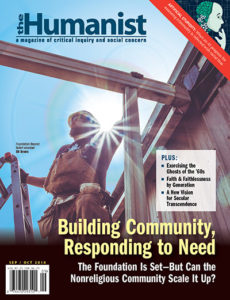 Cover photo image by Josiah Mannion.
Cover photo image by Josiah Mannion. LAST FALL THE UNITED STATES and the Caribbean were battered by three devastating, record-breaking hurricanes—Harvey in Texas and Louisiana, Irma in the Caribbean and Florida, and Maria in Puerto Rico and other Caribbean islands. The destructive power of these hurricanes was extreme, but their impacts were exacerbated by human decisions before and after the storms; they might have been natural disasters, but their aftermaths are a matter of human rights.
Hurricanes are unique natural disasters because we know they’re coming for days in advance. This means that those living in the potential path have time to prepare or evacuate. However, many people don’t have the resources to adequately prepare, the option to evacuate, or the funds to rebuild their lives afterward. During the worst hurricanes, those not in the path of the storm watch, feeling anxious and helpless, as the media broadcast images of people stranded in their damaged homes or wading through flood waters to get to safety.
Those of us outside the path feel helpless, but we may also feel compelled to help. Humanists aspire to reduce suffering and correct inequality. Anyone caught in the path of a natural disaster suffers, but the degree of suffering varies in ways that parallel existing social inequality. Those with lower incomes, less access to relief and recovery resources, or identities that already marginalize them in their communities suffer disproportionately as a result.
Humanists can and do help in ways consistent with our commitment to reason and evidence. Foundation Beyond Belief unites the humanist community to respond to these hurricanes through our Humanist Disaster Recovery program. Because of this effort, the humanist community continues to improve the lives of people in Houston and Puerto Rico as they rebuild from record-breaking hurricanes in 2017.
Hurricane Harvey
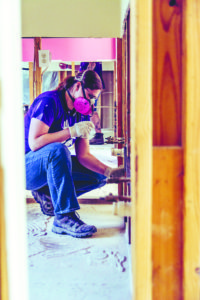
Kayla Snyder performs mold remediation at a private home in Houston, Texas. (Photo courtesy Josiah Mannion)
In August 2017 Hurricane Harvey made landfall as a Category 4 hurricane near Rockport, Texas. It was the first major hurricane (Category 3 or higher) to make landfall in the United States since Wilma in 2015. Once over land, Harvey quickly weakened to a tropical storm before stalling near the Houston metro area for several days. The storm dropped over sixty inches of rain in southeastern Texas, which is more than the average annual precipitation in the area. (The annual average in Houston, for example, is 45.28). The extraordinary amount of rain in such a short amount of time caused historic flooding and made Harvey the second-most costly hurricane in US history, surpassed only by Hurricane Katrina in 2005. After losing some intensity, Harvey hit Kentucky, Tennessee, and Arkansas as one of the wettest tropical cyclones and most prolific tornado producers on record.
In addition to the storm’s stall, massive urban growth exacerbated the damage in Houston. Fields can soak up water, but concrete cannot. Outdated flood maps that formed the basis of the National Flood Insurance program resulted in thousands of flooded homes whose owners didn’t carry flood insurance. Renters and those in public housing generally have fewer options and receive less aid on average. Low income families are disproportionately affected by events like this; in Houston, the median household income for black and Hispanic families is less than half of that for white families.
Hurricane Maria
From the nineteenth century to 2017, only four Category 4 hurricanes had come within seventy-five miles of Puerto Rico. Then, in September 2017, the island was hit by two major hurricanes in one month—Irma and Maria. Irma was a Category 5 when it passed just to the north, leaving 63 percent of Puerto Rico residents without power and officials predicting weeks to months to fully restore power to the island. At least three died as a direct result of Irma in Puerto Rico, and people had no time to start recovery efforts when the Category 4 Maria passed directly over the island just two weeks later. According to the National Hurricane Center, Maria was the third most costly hurricane in US history, behind Katrina and Harvey. The official government death toll for Maria in Puerto Rico is sixty-four, but a Harvard study found that more than 4,600 people died in the aftermath of the hurricane as a direct or indirect result of the storm.
Recovery from Maria has been particularly slow. As of July 2018, nine months after Maria and well into the new hurricane season, power still hadn’t been fully restored to the island. The blackout following Maria is the biggest in US history and the second biggest on record worldwide behind the blackout in the Philippines after Typhoon Haiyan in 2013. The length of the Puerto Rican blackout was broadened because of the controversy involving the ill-equipped and suspiciously selected contractor Whitefish Energy. A blackout of this magnitude isn’t just an inconvenience—it’s a threat to life.
Further complicating the situation was the fact that many of the FEMA workers sent to Puerto Rico didn’t speak Spanish. And the process to follow up on a FEMA application was electronic—in a place where electricity was scarce. Lack of power slows rebuilding and hinders medical care. In this atmosphere of uncertainty and risk, many decided not to rebuild and went to the US mainland permanently.
There has also been a reported spike in domestic violence and sexual assault since Maria, with even lower-than-average reporting in the immediate aftermath because of downed phone lines and overwhelmed emergency services. Hurricane recovery is already stressful and potentially traumatizing. That trauma is only exacerbated by sexual assault, domestic violence, and reduced access to police, healthcare, and other services (like domestic violence shelters) that would generally be available. Women, particularly poor women, who already live in an inequitable society in Puerto Rico faced lower physical safety well after the hurricanes were over—on top of figuring out how to get safe water, food, and shelter.
On top of everything else the island is also facing a suicide crisis. The number of people who have called Puerto Rico’s Department of Health reporting that they have attempted suicide is up 246 percent compared to the same time the previous year, and people reporting suicidal thoughts is up 83 percent.
Humanist Disaster Recovery
It’s hard to hear of the immensity of these storms and the ongoing crisis and not lose hope. But there is reason to hope. People are on the ground around the world working to mitigate these disasters. Last fall, Foundation Beyond Belief (FBB) joined myriad efforts in launching three campaigns to support recovery in the regions affected by these storms, and humanists heeded the call, giving over $150,000. The impact of those donations is still being felt.
“Disasters exacerbate existing inequalities. But if we humanists apply our money and our time effectively, where we know it’ll have the most impact, we can erase some of the effects of that inequality.”
The Humanist Disaster Recovery (HDR) program ensures that FBB’s efforts contribute to a coordinated, appropriate, and effective recovery from disasters around the world. Our staff determines which events to address by applying a well-developed set of criteria, ensuring that donated money and time will be as effective as possible. It’s well known in emergency management that donations decrease dramatically as soon as the response period (immediate lifesaving) is over. After the storm, as the hard work of rebuilding begins, the images leave our news screens, and it can be easily forgotten that the struggle carries on. Donations to organizations working on recovery (which comes after response) in their communities are the most needed and therefore the most effective. For this reason, we launch our campaigns at the time of the event but designate the grant funds to recovery efforts.
HDR has two components. One is collecting donations from our community and donating them to provide support to secular organizations that work locally to meet the needs of recovering survivors. The other is to mobilize humanist volunteers to the site of a disaster to physically help rebuild. In the case of Harvey, we did both.
We had three beneficiaries for Harvey: BakerRipley, The Montrose Center, and All Hands and Hearts: Smart Response (formerly All Hands Volunteers). BakerRipley is a neighborhood support group that focuses on supporting immigrant, Hispanic, and low-income neighborhoods to develop the uniqueness of each neighborhood. Their programing is based on going where they’re invited, identifying the unique strengths a community already has to build on, working side-by-side with community leaders and residents, and following their lead. Being local and already a part of many Houston communities, they were in an excellent position to help those communities recover. In Harvey’s wake, they expanded the services they provide at their community centers to include outreach and assessment, workshops, and direct assistance.
The Montrose Center is a community center that empowers the Houston LGBT community to enjoy healthier and more fulfilling lives. Like other marginalized communities, the LGBT community has unique needs during a disaster that Montrose is in a good position to address. LGBT youth experience high rates of homelessness, making them more vulnerable during a disaster. Similarly, LGBT seniors experience higher rates of isolation than their straight counterparts, making access to resources more difficult. A deep-rooted lack of trust among LGBT people toward emergency responders and healthcare providers, the result of a history of discrimination, hinders access even further. Since Harvey, the Montrose Center has expanded their services to include recovery housing assistance, furniture, shelf-stable meals, medication, and behavioral health counseling.
Our third Harvey beneficiary, All Hands and Hearts: Smart Response (AHAH), was also our partner for our humanist volunteer deployment. AHAH is a natural disaster response and recovery organization that adapts to the needs of the local community enlisting short- and long-term volunteers to rebuild safe, resilient schools, homes, and other community infrastructure. AHAH is committed to helping Houston residents rebuild for at least two years following Harvey.
Over two weeks in April 2018 a group of FBB volunteers deployed to join other AHAH volunteers in Houston to help the city recover. Eighteen volunteers contributed 584 hours of service, providing more than $14,000 worth of donated time working on flooring and insulation installation, demolishing and rebuilding a wheelchair ramp, and completing priming, painting, and mold remediation at homes and a school in the Houston metro area.
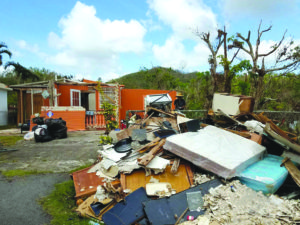
Recovery is the longest phase of a disaster but receives the least attention. (Photo courtesy Proyecto Matria)
One of the homes Foundation Beyond Belief volunteers helped rebuild had 2.5 feet of standing water inside it due to Harvey. The homeowner fell victim to a common disaster scam, which can be very effective when a homeowner is stressed and overwhelmed. They’ve lost cherished items; they can’t live at home and are often in shelters; they have limited funds for recovery and face government bureaucracy; their friends, family, and community are dealing with the same issues; and their muck and gut work (referring to the process of first removing all debris and mud and then taking out dry wall, insulation, flooring, and so on) must be completed as soon as possible in order to prevent mold growth, which is costly to treat. Legitimate contractors are expensive and in high demand, giving wealthy people a huge advantage toward getting back into their homes and back to some normalcy and routine. The owner of the home that FBB volunteers helped rebuild did hire people to muck and gut her house, but they took $6,000 of her money, did little work, and disappeared. All Hands and Hearts completed the muck and gut, and since she qualified for rebuilding, they replaced the drywall and hired people to mud the walls (which involves evening out seams between drywall and indentations from nails). FBB volunteers were subsequently part of the painting team for three days.
FBB volunteers also worked on a house whose owner had died just a few days before Harvey hit. The owner’s daughter had to restore two homes while grieving, and in her father’s home there were many items she couldn’t bring herself to touch. However, the items needed to be removed from the home in order to sanitize the residence and prevent mold growth. During disaster recovery, it’s common for volunteer groups, whose focus is to get as much done in as little time as possible, to further traumatize a homeowner by carelessly tossing their belongs away. There is no way to know what items hold value for someone, and so it’s vital that they treat all items, even damaged items, with care and respect. At this home, we listened to the homeowners’ needs and helped them move things out to the garage. Homeowner-first mentality is one of the values of the HDR program.
Mold remediation can be a tedious process. Scrubbing the wood—seven times for all exposed wood surfaces—activates the mold spores. Vacuuming all exposed surfaces of the wood pulls as much mold spores out as possible, and spraying disinfectant kills the remaining mold. AHAH will muck and gut for any person regardless of financial situation. In the case of the daughter whose father died, her home didn’t qualify for rebuilding and she would to have to hire a contractor herself. But the FBB volunteers finished the mold remediation a day early, which made it that much more possible for the homeowner to move in before her FEMA housing ran out in June.
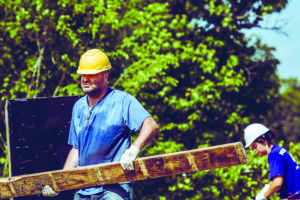
Roger Tilson at the Rhodes School. (Photo courtesy Josiah Mannion)
FBB volunteers also helped rebuild the Rhodes School, which served primarily low-income minority communities. The school offered tuition-free education to 550 students before it flooded during Harvey.
In Puerto Rico, FBB funded two beneficiaries—Hispanic American Freethinkers (HAFree) and Proyecto Matria. The HAFree community organized a collection for critical supplies and arranged to deliver them to Puerto Rico, and FBB gave a grant to cover the transportation and purchase some additional supplies.
The other Maria beneficiary, Proyecto Matria, is a local organization working to help women become self-sufficient in order to overcome situations of violence and gender discrimination. Founded in 2004, they empower women in Puerto Rico with services, including housing services, which are vital in the wake of destruction. They also provide education, psychological support, and job assistance in the form of small-business incubators and microcredit services.
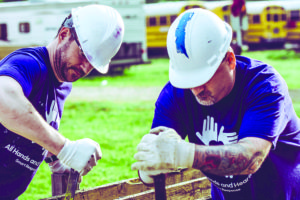
Mark Andrews and Tom Amon at the Rhodes School. (Photo courtesy Josiah Mannion)
These are important considerations for FBB as we research and evaluate beneficiaries. First, locally run organizations are best suited to handle recovery, especially in the long term. They already have the infrastructure and relationships in the affected community. Second, during the recovery process, research suggests women will likely face unique and more severe needs. They must tackle three interrelated things: women’s health threats, an increase in gender-based violence, and economic strain. This issue has been researched in a number of countries around the world following all manner of disasters and generated similar results.
Proyecto Matria addresses many of these issues directly. In the wake of the hurricane destruction, they set up centers called “Casa Solidaria Matria” (Matria Solidarity Home). These centers serve as models to be recreated in other communities and serve multiple purposes, including making hot meals available to families in need, serving as classroom space for children whose schools remain closed, space for business incubators using Proyecto Matria’s current model, psycho-social services to aid in the prevention of and to intervene in intrafamily violence cases, as well as help assisting with the evaluation of homes to coordinate reconstruction.
Because of the ongoing humanitarian crisis in Puerto Rico, FBB provided additional post-disaster support by featuring Proyecto Matria as our Human Rights beneficiary for the second quarter of 2018 in our Humanist Grants program.
Compassionate Efficiency
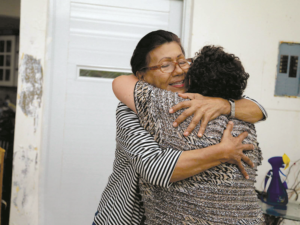
At Proyecto Matria in Puerto Rico, women are empowered through housing services, education, psychological support, and job assistance. (Photo courtesy Proyecto Matria)
Disasters exacerbate existing inequalities. But if we humanists apply our money and our time effectively, where we know it’ll have the most impact, we can erase some of the effects of that inequality. Some methods are more effective than others. Local organizations are better situated to enact efficient recovery in their own communities than outside organizations who don’t have strong relationships in place or know the community’s unique needs. Organizations already working with marginalized communities know what their unique needs are during and after a disaster and how to address them. Supporting a community’s recovery rather than the early response to a disaster has a greater impact. Recovery is the longest phase of a disaster but receives the least attention which translates to far fewer resources than the response period. FBB directs grants to organizations engaged in recovery and sends volunteers to help rebuild because recovery donations are hard to come by and volunteers become scarce.
There’s nothing we can do to prevent natural disasters, and they will only become more prevalent due to climate change. In the case of hurricanes, scientists aren’t expecting an increase in the number of hurricanes, but they are expecting an increase in the intensity and destructive power of hurricanes as sea temperatures and levels rise. We can develop ways to mitigate and prepare for natural disasters—for example, cities can be designed with better drainage systems and families can create evacuation plans—but whatever we do, disasters will still happen. People’s homes will be damaged or destroyed. Food and water may become contaminated or scarce. The most basic human rights become, at least temporarily, insecure. People will suffer. We are compelled to help make that period as brief as possible. We choose the most effective response, which is also the most compassionate response. That is humanism at work.
The Humanist Disaster Recovery program is sustained through a partnership between Foundation Beyond Belief and the American Humanist Association (AHA). We thank AHA for their generous support of our efforts.
